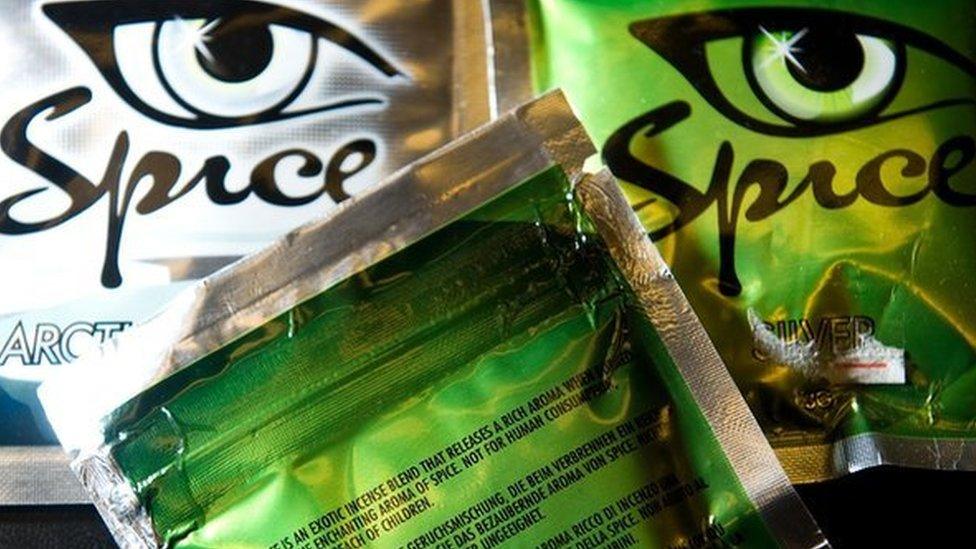Legal highs: Psychoactive drugs policy 'rushed', say MPs
- Published
Legal high policy 'rushed' say MPs
Legislation to ban new psychoactive substances in the UK is being rushed, MPs have warned.
The Home Affairs Committee said ministers were not working properly with their own expert drug advisers.
The MPs also said past governments' spending on education about the dangers of so-called legal highs had been "shockingly inadequate to date".
Policing minister Mike Penning said the government would consider the committee's criticism.
New psychoactive substances (NPS) are products chemically designed to mimic drugs that are already banned. Some 67 deaths in England and Wales last year were linked to their use.
Blanket ban
The substances have been typically known as "legal highs", but in most cases they had only remained lawful because there had been no scientific testing and advice leading to a ban.
One hundred new NPS products were identified across the EU last year and legislation going through Parliament will create a blanket ban on all of them and their successors. These measures, based on a law from Ireland, will replace the current system of banning substances one at a time.
But the MPs said that the Psychoactive Substances Bill, external was being rushed amid a lack of clarity over whether it could actually work.
The committee also said it opposed plans to ban "poppers", a substance often used recreationally and referred to as a "party drug".
Poppers, the name given to a group of chemicals called alkyl nitrites, are normally sniffed from a bottle producing a short head-rush. The Home Office has said they will be covered by the new laws.
But the committee referred to the conclusion of the Advisory Council on the Misuse of Drugs (ACMD) that the misuse of poppers was "not seen to be capable of having harmful effects sufficient to constitute a societal problem".
'Risk of being overwhelmed'
Keith Vaz, the committee's chairman, said: "Britain uses more psychoactive substances than any other country in Europe and is at risk of being overwhelmed by the sheer scale of this problem.
"Legislating on this issue is the right thing to do, however doing so at speed without any consultation may be counter-productive.
"The concerns expressed have been dealt with in a piecemeal manner and there has been unsatisfactory communication with the Advisory Council [on the Misuse of Drugs], the very body that the ministers should rely on for advice."
The MPs said there had been no clarity on the relative harm of different types of NPS - and therefore what kind of sentences courts should impose on future offenders.
And they also attacked ministers for failing to do enough to warn young people of the dangers of the substances.
"Successive governments' spending on education on the dangers of NPS has been shockingly inadequate to date," said the report.
"Action must be taken now, to educate young people about NPS, through stronger and wider public information campaigns.
"There is substantial evidence that the market for NPS is already moving online, which, due to the anonymity that the internet can provide, is a challenge for prosecuting authorities to monitor and control."
'Cat and mouse'
Mr Penning said: "The landmark Psychoactive Substances Bill will fundamentally change the way we tackle new psychoactive substances - and put an end to the game of cat and mouse in which new drugs appear on the market more quickly than government can identify and ban them.
"The blanket ban will be on the production, supply and importation of these harmful substances, which caused the unnecessary and tragic deaths of 129 people in the UK last year.
"Unscrupulous suppliers will not be able to hide online, as our bill will give police the power to shut down websites trading in these potentially dangerous drugs."
But the homeless charity Centrepoint, which works with many young people who have used NPS products, said the proposed blanket ban was not enough.
""The young people most at risk need much more than the £180,000 the government has spent to date on educating them about legal highs," said Jennifer Barnes, the charity's head of policy. "That is why we are calling on government to put their money where the ban is and back up this tough legislation with an approach to treatment and education which recognises the complex causes of substance use."
- Published29 September 2015

- Published1 April 2015

- Published29 May 2015

- Published10 June 2015